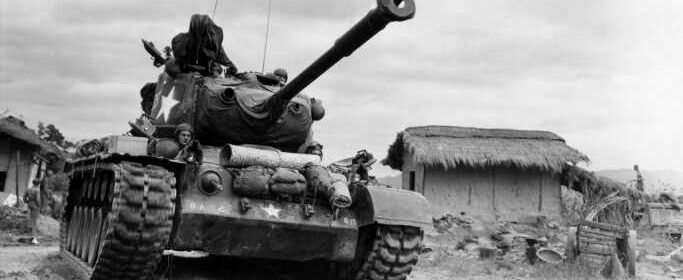Every Tank in the History of the US Army

At the beginning of the year, the United States promised 31 M1 Abrams battle tanks to Ukraine to fight off the Russian invasion that is now stretching well into its second year. Recently, the Department of Defense announced the tanks would potentially be delivered by this coming fall, earlier than expected.
With the White House calling it “the most capable tank in the world,” the M1 Abrams is quite different from the first tank the U.S. military used, in World War I, the Renault FT-17. (See how Ukraine’s newly bolstered tank army compares to Russia’s.)
The two-man light tank, made by French car company Renault, is considered the world’s first modern tank and included many features still seen on modern tanks — notably, a 360-degree rotating turret. It entered service in 1917, the year the U.S. Tank Corp was formed. A year later, the first American tanks were manufactured, starting with the Ford Model 1918 3-ton and the M1917 6-ton, which entered service in 1918.
Tanks have only continued to evolve since. To identify the U.S. military tanks throughout the years, 24/7 Wall St. reviewed a list of tanks used by the U.S. military from Military Factory, an online database of vehicles, aircraft, arms and more used by militaries across the world. Tanks are listed according to when they entered the service. Data on the type of tank, country of origin, crew size, wars served, and number produced also came from Military Factory.
Though different American tanks with varying qualities were built during the Second World War, including the Pershing with its unreliable transmission, it was the British-made M4 Sherman “that would become a legend on the battlefield,” according to Popular Mechanics. The Sherman, an all-round medium tank, came with a 75mm gun as standard and had a five man crew. (This is the largest tank battle in history.)
Though the Sherman was still used in Korea, in the Vietnam War, the M48 Patton and later the M551 Sheridan light tank became the workhorses of the war. Meanwhile, the concept of the Main Battle Tank – to combine the firepower and protection of a heavy tank with the mobility of a medium tank by using composite armor and improvements in engine, suspension, and more – continued to develop. The M60 Patton, which entered service in 1960, packed a 105mm gun, had armor up to 10 inches thick, and could travel up to 30 mph with a crew of four.
But even that could be improved – enter the M1 Abrams, which weighs about 10 times WWI tanks and itself is being constantly upgraded. Incorporating new electronics and GPS systems, a new type of armor that is up to a foot thick in some places, and packing a 120mm M256A1 smoothbore gun that can pour armor-piercing rounds with depleted uranium penetrators and M830 high-explosive anti-tank rounds, it proved itself in the Gulf War, destroying multitudes of Iraqi tanks.
What’s next for tanks? Improvements in armor and armaments certainly are in the works, as are the incorporation of drones and other new technologies.
Click here to see every tank in the history of the US military.
Sponsored: Find a Qualified Financial Advisor
Finding a qualified financial advisor doesn’t have to be hard. SmartAsset’s free tool matches you with up to 3 fiduciary financial advisors in your area in 5 minutes. Each advisor has been vetted by SmartAsset and is held to a fiduciary standard to act in your best interests. If you’re ready to be matched with local advisors that can help you achieve your financial goals, get started now.
Source: Read Full Article
